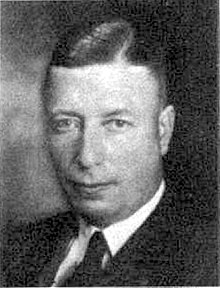Adolf Schuppel
Adolf Schuppel (born June 21, 1895 in Waldshut ; † August 14, 1946 in Fort Ney north of Strasbourg ) was a German politician ( NSDAP ).
Live and act
The son of a car attendant attended elementary school and completed training at the teachers' college in Heidelberg . From 1914, Schuppel took part in the First World War as a war volunteer with the 3rd Reserve Grenadier Regiment 110 . An acquaintance during the war that was momentous for Schuppel's future was his encounter with the later Baden Gauleiter, Robert Wagner , who belonged to the same regiment . In 1915 he was seriously wounded at the Lorettohöhe . From 1916 to 1918 he fought on the Eastern Front . After the war ended, he was a member of a volunteer corps that fought on the side of the White Army in Ukraine during the Russian Civil War. Schuppel became a prisoner of war . At the time of his return to Germany, Schuppel was a lieutenant in the reserve and holder of the Iron Cross of both classes as well as the Wound Badge and the Front Fighter Honor Cross . From 1920 he was a sub-teacher in Eutingen near Pforzheim ; In 1924 he was transferred to Schwanenbach near Hornberg as main teacher . Schuppel married in 1923; the marriage remained childless.
Schuppel joined the NSDAP in 1922. It is not known for sure whether he founded a local NSDAP group in Eutingen . After the party was temporarily banned after the Hitler putsch , he rejoined the party in 1928 and became district leader for Wolfach and Villingen in the same year . A report by the Baden State Police Office describes Schuppel as an "old champion of the movement in the Gutach Valley and the rear Kinzig Valley ". A disciplinary proceedings because of his political activity had in 1930 for Schuppel a fine of 100 RM and a reference result.
After the transfer of power to the National Socialists, Schuppel was fully reimbursed for the fine. In 1933 he was promoted to rector of the Hornberg elementary and community school ; In 1934 he was promoted to district high school councilor for Villingen. In 1933 Schuppel was a member of the Baden state parliament . From April 1938 until the end of the Nazi regime in the spring of 1945, Schuppel, who was also the holder of the Golden Reich Honor Sign and the Silver Gau Ehrenzeichen of the Gau Baden of the NSDAP, was a member of the National Socialist Reichstag for constituency 32 (Baden) . He served in the party as a district inspector from 1933.
In 1935 Schuppel took early retirement and from then on worked as a full-time party official. He took over the Gaupersonalamt, which developed under his leadership "to the personnel policy switch station of the Nazi rule in Baden". Schuppel is counted among a "Gauclique" around Gauleiter Wagner; since his appointment as Gaustabsleiter in 1942 he was in fact the second most important functionary in Baden. In 1942, Schuppel counted the NSDAP party chancellery among the functionaries who could be considered for the highest tasks in the party and the state. Since the German occupation of France in 1940, Schuppel was also head of the personnel office at the head of civil administration in Strasbourg.
At the end of the war, Schuppel was captured by the Allies. From April 23 to May 3, 1946 a French court martial in Strasbourg tried against Schuppel, Wagner and other Nazi functionaries as those responsible for the illegal use of Alsatians for military service in the German army. Like Wagner, Schuppel was sentenced to death by shooting and executed in August 1946 .
literature
- Joachim Lilla , Martin Döring, Andreas Schulz: extras in uniform: the members of the Reichstag 1933–1945. A biographical manual. Including the Volkish and National Socialist members of the Reichstag from May 1924 . Droste, Düsseldorf 2004, ISBN 3-7700-5254-4 , p. 602 f .
- Hubert Roser: Schuppel, Adolf. In: Fred L. Sepaintner (Ed.): Badische Biographien Volume 5, Kohlhammer, Stuttgart 2005, ISBN 3-17-018976-X , p. 256 f.
Web links
- Adolf Schuppel in the database of members of the Reichstag
Individual evidence
| personal data | |
|---|---|
| SURNAME | Schuppel, Adolf |
| BRIEF DESCRIPTION | German politician (NSDAP), MdR |
| DATE OF BIRTH | June 21, 1895 |
| PLACE OF BIRTH | Waldshut |
| DATE OF DEATH | August 14, 1946 |
| Place of death | Fort Ney north of Strasbourg |
